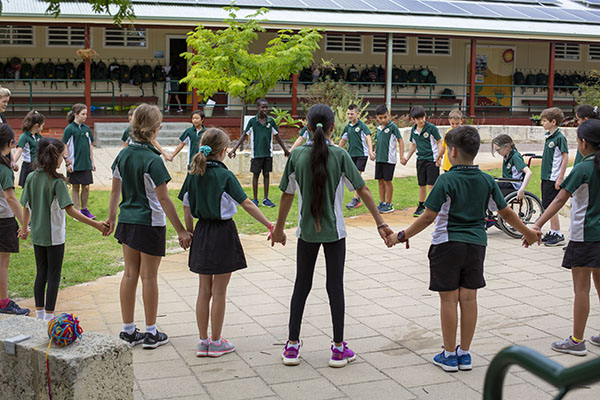Overview
Alignment with Be You Domains
-
Learning Resilience
Alignment with Early Years Learning Framework (EYLF)
- Children are confident and involved learners
- Children are connected with and contribute to their world
- Children are effective communicators
- Children have a strong sense of identity
- Children have a strong sense of wellbeing
Alignment with Australian Curriculum
- Health and PE
- Humanities and Social Sciences
Target audience
- Early learning
- Primary school
Target groups
- Individual
- Small group
- Whole class
- Whole school
Aims
Fun FRIENDS is a play-based social skills training program for building resilience in young children.Program theory
The theoretical model for the prevention and early intervention of anxiety and depression in the program addresses attachment (emotions), physiological (body), cognitive (mind), and learning (behaviour) processes. Peer learning model: the program has been designed to be implemented in a naturalistic environment with a group of participants of similar age. Experiential learning: most activities are based on experiential learning, encouraging participants to learn from their own experiences.Topics
In staged sessions, children are introduced to concepts of all feelings being OK, social skills training, aspects of healthy living, identifying basic feelings,paying attention to other people's feelings, breathing techniques and paying attention to the body's reactions, an introduction to 'red' and 'green' thoughts, changing 'red' thoughts to 'green' thoughts, problem-solving, being a kind friend and identifying people they can look to for support.Cost
Program structure
The program comprises 12 sessions of one hour each. There is some flexibility in how these can be facilitated.Instructor
- External facilitator
- Psychologist
- Educator
- Wellbeing leader
Instructor training
Teachers are required to complete the Adult Resilience program prior to completing other versions of the FRIENDS Programs. Each course takes approximately 8 hours to complete (Adult Resilience + Fun FRIENDS).Supporting resources or materials available with program
- Manual
- Online webinars
- Posters
- Workbook
Ongoing support
Ongoing phone contact. Support is provided as requested.Parent involvement
- Attend information sessions
- Written information provided to parents
Origin of program
Australia
Friends Resilience
Program authors
Dr Paula Barrett
- PO Box 5699,West End QLD 4101 Australia
Ratings
Summary of evidence factors
This is a summary of the evaluation or research study characteristics that contribute to the program’s evidence rating.
|
Positive impact on at least one outcome for children and/or young people?
The study reported positive outcomes. |
Yes |
|---|---|
|
Link between program description and theory of change
Theory of change refers to whether there was a comprehensive description and illustration of how and why a desired change is expected to happen in a particular context. |
Some links |
|
Study design
Type of study design reported. |
Randomised control trial |
|
Independence
The degree to which the program authors were involved in the research. |
Completely |
Summary of implementation factors
This is a summary of the program’s characteristics that contribute to its implementation rating.
|
Feedback sought from participants
Participants enjoyed the program and understood its benefits. |
Yes |
|---|---|
|
Feedback sought from instructors
Instructors enjoyed the program and understood its benefits. |
Yes |
|
Groups program is not suitable for
Groups the program wouldn't be suitable for or that required further research to determine suitability. |
Assessed and reported |
|
Training provided during study
The model of training provided. |
Face to face, all instructors, in person |
|
Ongoing instructor support provided during study
Whether ongoing support is provided. |
Yes |
Context
This is a summary of the context in which the evidence for the program was established.
|
Study Participants
Pre school, primary school (Foundation to Year 6), secondary school (Years 7 to 12). |
Early learning Primary school |
|---|---|
|
Country of Study/s
The location in which the evidence or research was conducted. |
Australia |
|
Location of Study/s in Australia
The state (or states) the program was assessed in Australia. |
QLD |
|
Evaluation of program in culturally and linguistically diverse populations
Provider has included culturally and linguistically diverse people when assessing the program. |
Yes |
|
Evaluation of program in Aboriginal and Torres Strait Islander children and young people
Provider has included Aboriginal and Torres Strait Islander peoples when assessing the program. |
No |
|
Evaluation of program in low socioeconomic groups
Program has evaluated a diverse socio-economic population in their research. |
Yes |
|
Developmental based adaptations to program design and delivery
Shorter sessions for younger students or activities are adjusted for age appropriateness. |
No |
|
Evaluation of program in children and young people with disability and/or learning difference
Provider has included participants with a disability or learning difference when assessing the program. |
Yes |
Last updated: 19 November 2021
